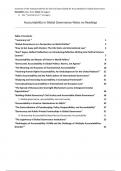Summary
Summary Accountability in Global Governance Notes on Readings
- Course
- Institution
Summary of the reading materials for the final exam (2024) for Accountability in Global Governance. INCLUDES notes from (Total: 65 pages): See * Summary List * on page 1.
[Show more]



